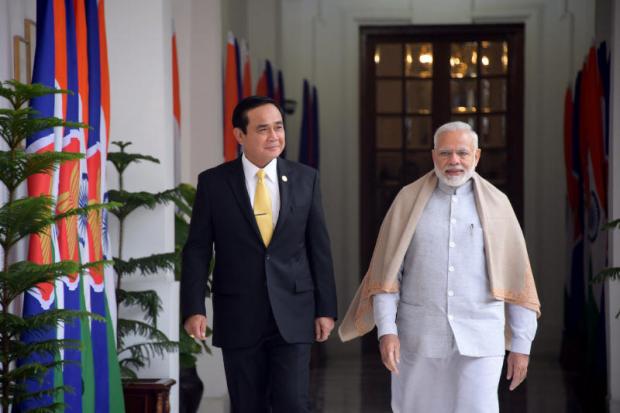
Indian Prime Minister Narendra Modi will be bringing a long to-do list when he touches down in Thailand in early June. It includes joint defence manufacturing, cruise tourism, maritime transport, a possible "white shipping" agreement, highway transport via Myanmar, and strengthening of cultural links, among others.
Mr Modi's trip, the first by an Indian prime minister to Thailand in five years, will come three months before Thailand becomes the country coordinator for India with Asean.
The visit will come about 18 months before India hopes to complete the trilateral highway connecting its northeastern region with Myanmar and Thailand, opening an important new route to Southeast Asia.
Officials hope that Mr Modi and his Thai counterpart Prayut Chan-o-cha will be able to put in place rules and regulations needed for people travelling on the highway. This could include a trilateral motor vehicle agreement (MVA) between India, Thailand and Myanmar, which has been stalled because of reservations from Nay Pyi Taw. It could also involve setting up posts for customs and immigration checks of vehicles and their occupants.
Thailand's ambassador to India, Chutintorn Gongsakdi, emphasised "soft connectivity" in the run-up to the 25th commemorative India-Asean summit that took place in New Delhi last month. "What is more important is that when the road is finished, we have to be prepared on the customs, immigration and quarantine aspects because we cannot have roads and then people getting stuck at the border," he was quoted as telling an Indian news agency.
India's foreign ministry and Nitin Gadkari, the minister for road transport and highways, are on record as saying that the highway would be complete by the end of 2019.
Mr Chutintorn acknowledged that customs, immigration and quarantine were the difficult parts of the connectivity equation. "The prime minister of Laos once said that we cannot have a situation where it takes five hours to get from one country to the next and then you have another five hours of customs, immigration and quarantine. We have to make sure that this does not happen. It has to be seamless and smooth," he said.
What has greatly impressed the Indian foreign ministry is how "congenial" the atmosphere was when Gen Prayut and his delegation visited New Delhi last month for a commemorative summit held to mark 25 years of formal India-Asean relations.
"We were taken aback by the friendly vibes," a ministry official told Asia Focus. "Unlike Indonesia, which has reservations about [efforts by] India, the United States, Australia and Japan to counter China's aggressive behaviour in the Indo-Pacific region, the Thai delegates welcomed the move."
Dr D Bhattacharjee, a research fellow with the Indian Council of World Affairs (ICWA), said there was significant scope for strengthening maritime security cooperation between Delhi and Bangkok. He spoke of a possible "white shipping" agreement that could help the two countries check piracy in the Strait of Malacca. India already has such agreements with Vietnam and Singapore.
A white shipping agreement is a protocol that allows the navies of two countries to exchange information about identity and movements of ships in their maritime territories. Ships are classified into white (commercial), grey (military) and black (illegal) vessels.
Dr Bhattacharjee also said India and Thailand could enter into joint production of defence equipment. In an interview with Asia Focus, he said Thailand needed short-range missiles, patrol boats and light combat aircraft and it could buy these from India. As a member of the multilateral Missile Technology Control Regime (MTCR), New Delhi can sell indigenously manufactured missiles.
He observed that India-Thailand relations have been on upward trend, with Gen Prayut visiting the country twice in the past 18 months. Unlike Vietnam, he said, where the Indian diaspora has declined in recent years, in Thailand it has increased and Mr Modi could seek to meet with some key Indian personalities in Thailand during his trip.
Pankaj Jha, an assistant professor with the Jindal School of International Affairs at Jindal Global University in Delhi, believes Thailand could provide a platform for fabrication of tanks as it has highly developed truck technology. A former member of the National Security Council Secretariat, Mr Jha believes Delhi and Bangkok will look for more synergy through automotive, manufacturing, logistics including Sittwe Port in Myanmar, the Mekong Ganga project and maritime security.
He also stressed the need for more research on Buddhist links between India and Thailand. Dr Bhattacharjee, meanwhile, would like Delhi to open Thailand study centres in Indian universities.
Mr Modi hosted the leaders of 10 Asean nations in New Delhi during India's 69th Republic Day last month. The summit, under the theme "Shared Values, Common Destiny", reaffirmed the importance of maintenance and promotion of "peace, stability, maritime safety and security, freedom of navigation and overflights in the region and other lawful uses of seas and unimpeded maritime commerce". It also talked of "disrupting and countering terrorists, terrorist groups and networks, including by countering cross-border movement of terrorists".
The combined gross domestic product of Asean, at US$2.8 trillion, is a bit higher than India's $2.5 trillion and its per capita annual income of $4,219 is more than double that of India. Bilateral trade is worth $73 billion, with India-Thailand trade accounting for $8 billion. New Delhi contributes only 2.6% to the region's international trade, which is minuscule in comparison to Asean's annual trade with China, which has risen to $473 billion.
Thailand was one of the first Asean countries to sign a free trade agreement (FTA) with India but it has never taken full effect because Delhi believes the "early harvest" system for selected goods favoured Thailand too heavily.
It is not clear whether Mr Modi will also be travelling to any other countries in the region during his trip to Thailand. Later this year, however, he is expected to visit Indonesia and Singapore, the venue for this year's East Asian Summit.